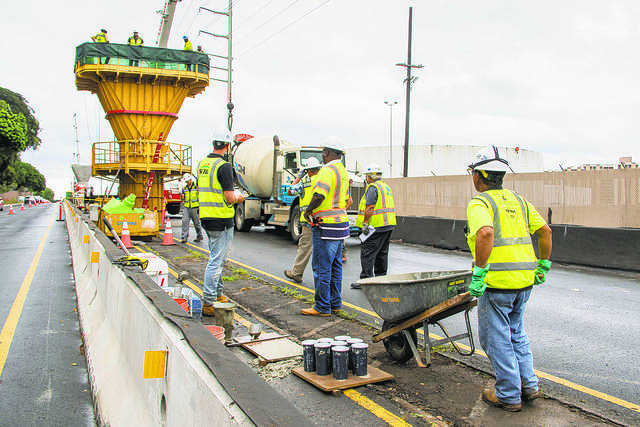Honolulu rail’s price tag now estimated at $8.3 billion, up $100 million

DENNIS ODA / doda@staradvertiser.com
Crews works on building guideway support columns along Kamehameha Highway early this year. A new report from a federal consultant estimates that the Honolulu rail project will cost $8.3 billion.
The latest report on the city’s troubled rail project by independent oversight consultant Jacobs Engineering Group estimates the project will cost $8.3 billion, a $100 million increase from the current estimate.
Damien Kim, chairman of the Honolulu Authority for Rapid Transportation, said the new estimate is good news since it’s not much higher than the $8.2 billion that HART has been projecting the 20-mile, East Kapolei-to-Ala Moana Center line will cost, before financing costs.
Using a different method to estimate construction costs, the Jacobs report “shows HART has gained control of the projects costs,” Kim said in a statement. “HART has already implemented several of the report’s recommendations and has plans to address the others.”
Jacobs was hired by the Federal Transit Administration to monitor project construction, identify any problems and report deficiencies or concerns. Formally, that role is project management oversight contractor, or PMOC.
The FTA, under a Full Funding Grant Agreement with HART that was formalized in December 2012, committed to providing $1.55 billion toward the project. But the FTA has withheld about $744 million of that, pending an acceptable project-recovery plan to how HART intends to address its rising costs.
The estimated construction price tag for the rail project has leaped 55 percent since December 2014, when the cost was put at $5.3 billion, prompting the FTA to demand a recovery plan.
Don't miss out on what's happening!
Stay in touch with breaking news, as it happens, conveniently in your email inbox. It's FREE!
It’s had been estimated to cost $8.2 billion, before financing costs that could add another $1 billion. HART officials insist they now have a better fix on costs and note that the estimate had not gone up since May 2016.
After several extensions, HART submitted a final recovery last fall. An FTA decision is pending.
HART Executive Director Andrew Robbins, in the same statement, also called the report good news, and notes that it refers to the potential benefit from cost-savings for the remaining city center section of the project, which has not been procured.
The HART board is expected to vote this month on whether to move forward with a plan to seek a business sector partner through a public-private partnership, which Robbins said will provide more certainty for scheduling and timing for the project, which is estimated to begin full operations in December 2025.
Since more than $4 billion of work has yet to be complete, “HART is highly confident in its ability to generate cost savings that will more than offset the difference in the PMOC estimate,” Robbins said.
HART will “work with FTA to reflect the recommendations made in the report, and to update its recovery plan,” Robbins said.



